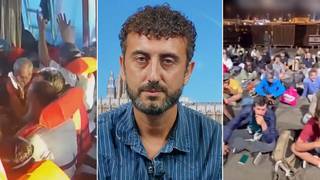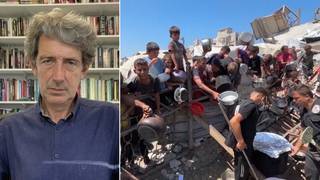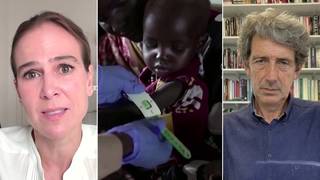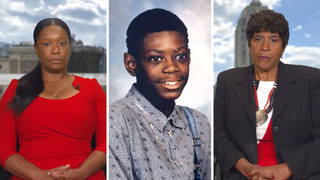
Guests
- Alicia Garzaco-founder of Black Lives Matter and special projects director for the National Domestic Workers Alliance.
- Patrisse Cullorsco-founder of Black Lives Matter, director of Truth and Reinvestment at the Ella Baker Center for Human Rights, and founder of Dignity and Power Now, a grassroots organization in Los Angeles fighting for the dignity and power of incarcerated people and their families.
- Opal Tometico-founder of Black Lives Matter and executive director of the Black Alliance for Just Immigration.
Links
- Part 2: #BlackLivesMatter Founders on Immigration & the Fight for “Safety Beyond Policing”
- Movement For Black Lives
- Alicia Garza on Twitter
- Patrisse Cullors on Twitter
- Opal Tometi on Twitter
- Ella Baker Center for Human Rights
- Dignity and Power Now
- National Domestic Workers Alliance
- Black Alliance for Just Immigration
As a Movement for Black Lives Convening is set to take place this weekend in Cleveland, we discuss the case of Sandra Bland and many others who have died in the custody of law enforcement with the three founders of the Black Lives Matter movement. Patrisse Cullors is the director of Truth and Reinvestment at the Ella Baker Center for Human Rights in Oakland, California, and the founder of Dignity and Power Now, a grassroots organization in Los Angeles fighting for the dignity and power of incarcerated people and their families. Alicia Garza is special projects director for the National Domestic Workers Alliance. And Opal Tometi is executive director of the Black Alliance for Just Immigration.
Transcript
NERMEEN SHAIKH: This week, protests across the country have called for justice in Sandra Bland’s case. Here in New York, at least a dozen people were arrested Wednesday after sitting down and locking arms in the street. They also raised questions about the death of Kindra Chapman, an 18-year-old African American found dead in her jail cell in Alabama just one day after Sandra Bland was found dead. Chapman was arrested July 14th on accusations of stealing a cellphone. She was found unresponsive in her cell 80 minutes after she was booked. Just like in Bland’s case, authorities have claimed she hanged herself, but her family does not believe it. At the protest in New York, demonstrators also mourned India Clarke, a 25-year-old African-American transgender woman who was found beaten to death Tuesday in Tampa, Florida. These are some of the voices from the protest.
UNIDENTIFIED: And I’m a second year in college. I go to The New School. I actually came out because I was informed by one of my friends that this was happening. And all the time—this is actually my first protest. It doesn’t seem like it’s a very well-known topic. Since, like, things like Eric Garner and everything, like everybody knew about that, but not many people knew about this, so I felt like it was my duty to, like, spread the word about what had happened. So, it felt more urgent to me. SayHerName means that she’s not forgotten, that her spirit lives on and that her presence is here and that she has a voice and that her lives matter. And because her life matters, all of our lives matter.
KALISA MOORE: I am KaLisa Moore of Peoples Power Assemblies. My organization put this demonstration on today because we really just want answers, answers to questions we already know: What happened to Sandra Bland? What happened to Kindra Chapman? What happened to Kyam Livingston? What happened to Aiyana Stanley-Jones? We all—we know that, you know, we live in a country of white supremacy that is continuing to kill black and brown people, both men, women and children. And basically, we organized this because we are fed up and we’re no longer taking it anymore.
KIMBERLY: My name is Kimberly. I’ve been with PPA for a couple of months. Well, I’ve been coming out anyway since the fall for Mike Brown. And a few months ago, there was a rally for Rekia Boyd, and, you probably heard, only about 25 people showed up for that. So, ever since then, I felt like it was very important, whenever something happens to a black woman, to also show up, just because it’s disheartening to see that we don’t get the same numbers, really, as we do when a man is killed. So I wanted to come out in honor of her and, you know, just respect her life. I just feel like it’s our responsibility as black women to mention it, because if we’re not even mentioning it, no one else is going to know.
AMY GOODMAN: The lives of Sandra Bland, India Clarke, Renisha McBride, Aiyana Stanley-Jones, Michael Brown, Eric Garner, Tamir Rice, Kajieme Powell, John Crawford and so many others will be the focus of a major Movement for Black Lives Convening in Cleveland this weekend. People from around the world are expected to attend.
For more, we go directly to Cleveland, where we’re joined by the three founders of the Black Lives Matter movement. Patrisse Cullors is the director of Truth and Reinvestment at the Ella Baker Center for Human Rights in Oakland, California, founder of the Dignity and Power Now, a grassroots organization in Los Angeles fighting for the dignity and power of incarcerated people and their families. Alicia Garza is special projects director for the National Domestic Workers Alliance. And Opal Tometi is executive director of the Black Alliance for Just Immigration.
We welcome you all to Democracy Now! Alicia, why don’t you begin on the significance of what has taken place, what you’re doing this weekend and the death of Sandra Bland?
ALICIA GARZA: You know, this weekend, over a thousand people are coming together to commemorate the lives of those of our family members who have been taken way too soon from us by police terrorism and state violence. And also we’re coming together to build a vision for the kind of world that we want to see. We want to see a world where black lives matter, in order for us to get to a world where all of our humanity is respected.
NERMEEN SHAIKH: And, Alicia Garza, could you take us back to when you coined the term “Black Lives Matter” and then link it again to what’s happened in Sandra Bland’s case?
ALICIA GARZA: Sure, of course. I mean, when Black Lives Matter was started, it was a very similar moment to this, where Trayvon Martin had been murdered by George Zimmerman, and George Zimmerman was acquitted in that murder. So, while George Zimmerman got to go home to his family, Trayvon Martin’s family will always have an empty seat at the dinner table. And we decided to design Black Lives Matter as an opportunity for black folks to come together to love on each other, to celebrate our resilience in the face of such adversity, but also to come together to organize and to build our social, political and economic power to change our conditions.
And what’s happening here with Sandra Bland is no different. Sandy Bland was driving, minding her own business, and that traffic stop ended her life. And we all have questions about what happened in that jail cell. We have questions about why was she pulled over in the first place. But the larger question at stake is: Why do black lives have such little value in our society that they can be taken at whim, with no answers, no accountability and no justice?
AMY GOODMAN: Patrisse Cullors, if you could talk about—well, the allegation is that she hung herself, that Sandy committed suicide, that she had expressed that she had attempted suicide in the past. They didn’t put her in a suicide watch, if this is all true. You deal with issues like these of people who are in prison.
PATRISSE CULLORS: Yes. I don’t believe Sandy committed suicide. And unfortunately, this issue of people found hanging in their cells is very common inside U.S. jails and prisons. For one, oftentimes guards are killing people inside U.S. jails and prisons, and then they’re hanging them to cover up the death and the murder. And then, secondly, for those folks who actually do commit suicide, it’s often because they aren’t being cared for in the hands of sheriffs and the hands of prison guards. And so we have this crisis inside U.S. jails and prisons, where people are left, and they’re vulnerable, and they don’t have a camera, like we do on the streets, and they don’t have a hashtag, like we do with folks who are dying on the streets at the hands of law enforcement. And so I think this case with Sandy Bland is really, really important for us to take a look at the U.S. incarceration system and the impacts it has on black lives.
NERMEEN SHAIKH: Patrisse Cullors, you have also worked specifically on county jails, and Sandra Bland died, was found dead, in a county jail. Could you talk about what the specific context and situation is in county jails as against other prisons in the U.S.?
PATRISSE CULLORS: Yes, I mean, the county jail is where you go while you’re awaiting trial, before you meet a judge. The county jail is where you go to really go through the process of whether you’re going to be prosecuted or not. And so, what we’ve seen, though, across the country is a trend, where people are ending up in county jails and being completely neglected. There’s severe medical neglect in county jails. There’s a significant amount of beatings that happen in county jails. And so, you’ve seen this in Los Angeles County. You’ve seen this in New York. You’ve seen this in Chicago, and now in Waller County. This isn’t—this isn’t new, unfortunately. And Sandy was a victim, a victim of state violence.
AMY GOODMAN: Opal Tometi, you are involved in immigration issues, as well as the whole issue of the way authorities treat people of color. You’re the daughter of two Nigerian immigrants, executive director of the Black Alliance for Just Immigration. Can you talk about the intersection of immigration and how people are treated of different hues in this country?
OPAL TOMETI: Yes. So, the reality is that criminalization of people of color is impacting us, whether you’re a citizen of the United States or you’re not. And what we’re seeing right now is the mass criminalization that is leaving low-income people of color, immigrant communities, whether you have legal permanent resident status, whether you’re undocumented, and it’s leaving them particularly vulnerable to the whims of local law enforcement and Immigration and Customs Enforcement.
What we’re seeing now is the deputizing of local law enforcement officials, so police, sheriffs and so on given the authority to act as though they are ICE agents. And so, this leads to all sorts of mishandling of cases of folks who might be in or out of status in this country. And what we’re seeing is that this collusion between Immigration and Customs Enforcement and local law enforcement is causing for rampant immigration detention as well as deportation. So the vast numbers that we’re seeing, the growing numbers every day, we’re seeing thousands and thousands of people each week being deported. This is a result of the ways in which our immigration system and criminal justice system have now been intertwined.
AMY GOODMAN: We’re going to break and then come back to this discussion. Our guests are Opal Tometi, Alicia Garza and Patrisse Cullors, the three co-founders of Black Lives Matter. Stay with us.
[break]
AMY GOODMAN: Nina Simone singing “Strange Fruit,” about lynchings in the South. This is Democracy Now!, democracynow.org, The War and Peace Report. I’m Amy Goodman, with Nermeen Shaikh. Our guests are the three founders of the Black Lives Matter movement, Patrisse Cullors, Alicia Garza and Opal Tometi, as we turn right now to what happened last weekend. Members of the Black Lives movement staged a protest inside the Netroots Nation conference in Phoenix by repeatedly interrupting Democratic presidential candidates Senator Bernie Sanders and former Maryland Governor Martin O’Malley. This is one of our guests today, Patrisse Cullors, interrupting Martin O’Malley’s portion of the event.
PATRISSE CULLORS: Let me be clear: Every single day folks are dying, not being able to take another breath. We are in a state of emergency. We are in a state of emergency! And if you don’t feel that emergency, you are not human.
AMY GOODMAN: Patrisse Cullors, can you take it from there, what you hoped to accomplish by addressing Governor O’Malley, as well as the group addressing Bernie Sanders, and what’s come of it?
PATRISSE CULLORS: Yes. That action was—yes, it was about the presidential candidates, but it was also about challenging white progressives. It was about challenging the notion that there’s only the lens of the economic justice agenda, and really challenging folks to look at the crisis in black America. Folks were very emotional during that rally, as you could hear in my voice. Sandy had just been murdered. We were trying to figure out how we were going to hold space for her at Netroots Nation. We wanted to make sure that we lifted up her name. And we wanted to make sure that folks didn’t go on with business as usual.
And so, part of that push inside of the presidential forum was to spark a debate, to spark a national debate amongst the candidates. And Hillary Clinton wasn’t there, but it was to challenge her, as well, to—people are often afraid to say black lives matter, they’re often afraid to use the word “black.” And we are not. We are in this moment because it’s absolutely necessary that we start to figure out a black agenda. Otherwise, we will continue to see the deaths of black folks at the hands of law enforcement, at the hands of the state. Otherwise, we will continue to be in this crisis.
NERMEEN SHAIKH: Well, I want to go back to that gathering. After the interruption, Senator Sanders threatened to leave the stage.
SEN. BERNIE SANDERS: Black lives, of course, matter. And I’ve spent 50 years of my life fighting for civil rights and for dignity. But if you don’t want me to be here, that’s OK.
MODERATOR: No, sir, we want you to—
SEN. BERNIE SANDERS: No, that’s OK.
MODERATOR: We want you to be here and address that and all the other questions.
SEN. BERNIE SANDERS: But I don’t want to out—I don’t want to out-scream people.
NERMEEN SHAIKH: Meanwhile, Governor Martin O’Malley responded to the interruption by saying, “Black lives matter. White lives matter. All lives matter.”
MARTIN O’MALLEY: Black lives matter. White lives matter. All lives matter. Black lives matter. White lives matter. All lives matter.
NERMEEN SHAIKH: Governor Martin O’Malley later issued an apology for the comment.
MARTIN O’MALLEY: I meant no disrespect to the point, which I understand and that Black Lives Matter is making. For many years—many years ago, when I ran for mayor of Baltimore, majority-African-American city, when we had allowed ourselves to become the most violent, part of what—part of what I called us to, as a people, was to the justice of realizing that, yes, black lives matter, and when we allow ourselves to assume that every year, as a city, we just have to accept that 300 young black men will die violent deaths, that we have to do a checkup from the neck up and realize, as a people, that if 300 young, poor white men were dying, we would have a different reaction to this as a state and as a metro area and as a city. So I meant—that was a mistake on my part.
NERMEEN SHAIKH: That was presidential candidate Martin O’Malley. So, Patrisse, can you respond to how your interruption was responded to?
PATRISSE CULLORS: Yes, I think the interruptions—the presidential candidates’ responses were important. What they did is they actually probably went back to their teams, had a discussion about their responses and regretted it. I think they both did pretty horribly on stage. They both were unable to really listen to the needs of the Black Lives Matter protesters. I think they were defensive. And so, since then, we’ve seen a number of them sort of release statements saying that black lives matter. But at this point, we have to move beyond rhetoric. I think it’s great that they’re finally saying black lives matter, but if there is no agenda, if there’s no policies that are going to back that up, then what is it worth?
AMY GOODMAN: And your meeting that’s taking place this weekend, Opal Tometi?
OPAL TOMETI: Yeah, in many ways, the meeting that we’re having here in Cleveland, the Movement for Black Lives, is a gathering of hundreds, and even over a thousand, black young people, elders and various people from different walks of life, who are coming together, networking, sharing ideas, building our knowledge base for what’s going on, and developing strategies to combat the pervasive violence that we’re experiencing at the hands of law enforcement, but also all across the board. So we’re looking for a progressive, comprehensive racial justice agenda that really cuts across various issue areas.
So, you know, for me, for example, I’m looking for candidates to deliver on a racial justice agenda that incorporates the needs of black immigrants from the Caribbean, from Africa, from different parts of Latin America and so on. And so, I think it’s really important that we’re having these gatherings, we’re able to raise our voices, share the unique ways in which we are impacted by state violence, and articulate a new vision for black life in the United States of America and across the world.
AMY GOODMAN: And, Alicia Garza, the whole issue of the $15-an-hour minimum wage, some people might be saying, “Why are you bringing that into this right now?” But it seems the Black Lives Matter movement is the intersection of all these different movements, whether we’re talking immigration, whether we’re talking about police brutality, or even the $15 minimum wage. Can you talk about how that relates?
ALICIA GARZA: Yeah, I mean, the Black Lives Matter movement has to, by its very nature, be intersectional, because of the complexities of who black people are in this country and throughout the world. There is nothing separate about wages from black life and the survival of black people than police violence and police terrorism. We even still have a situation in this country where we have black workers who are not covered by federal labor protections, like domestic workers and farm workers. So we certainly can’t just look at the issues of police violence. Police violence is the tip of the iceberg when it relates to the conditions overall of black people across the globe.
And so, as Opal mentioned, this weekend, people are coming together from across sectors, from across communities, from a wide range of walks of life, to really try to both understand our complexities and understand how we use our complexities as a way to leverage power. We’re ultimately here to figure out how is it that we transform conditions in this country so that we can transform the conditions in our world?
AMY GOODMAN: You are three powerful women. Did you ever think the Black Lives Matter movement would take off in this way?
ALICIA GARZA: I think that we are all deeply, deeply committed to the liberation of black people. And so, when you put people together who have and share that commitment, the sky is the limit. And, you know, we operate with an incredible, incredible team that is networked throughout 26 chapters across the world. And this movement would not be possible, this kind of excitement and the generation of energy would not be possible, without a brilliant, courageous, bold and innovative team of people.
AMY GOODMAN: Well, Alicia Garza, Patrisse Cullors and Opal Tometi, we want to thank you for being with us. We’re going to continue the conversation after the show and post it online at democracynow.org. The three co-founders of Black Lives Matter.












Media Options